– Dr. Robin S. Bon, University of Leeds, UK
Understanding potent small-molecule modulation of TRPC1/4/5 channels
– Prof. Mélanie Ethève-Quelquejeu, Paris Descartes University, France
Chemical Tools for the Study of L,D-Transpeptidases Involved in cell wall synthesis of bacteria
– Dr Romain Ferru-Clément, University of La Rochelle, France
Comprehensive untargeted serum lipidomics identified candidate biomarkers in Crohn’s Disease – Why medicinal chemistry is required to go further?
– Dr. Marion Flipo, University of Lille, France
Fragment-based approaches to inhibit Mycobacterium tuberculosis targets
– Dr Gilles Gasser, Chimie ParisTech, PSL University, Paris, France
Metal Complexes in Medicinal Chemistry
– Prof. Panayiotis Koutentis, University of Cyprus, Nicosia, Cyprus
Adventures in heterocyclic chemistry: Sulfur and/or nitrogen rich hetarenes
– Prof. Rui Moreira, University of Lisbon, Portugal
Title to be announced
– Prof. Vittorio Pace, University of Vienna, Austria
Designing New Synthetic Concepts for Imparting Molecular Complexity with C-1 Sources
– Prof. Sébastien Papot, University of Poitiers, France
Programming molecules for therapeutic applications
– Prof. Angela Russell, University of Oxford, UK
Discovery of small molecules to manipulate cell fate in vivo: towards new therapies for degenerative diseases
– Dr. Caroline West, University of Orléans, France
From impurity profiling to purified metabolites: Drug discovery supported by analytical and preparative supercritical fluid chromatography
– Prof. Catalin Zaharia, Polytechnic University of Bucharest, Romania
Drug-loaded polymeric systems as a promising tool for cancer management
CVs in Brief…
| Dr. Robin S. Bon University of Leeds, UK |
Robin studied Chemistry in Utrecht and Amsterdam, and obtained his PhD in Chemistry (2007) from the Vrije Universiteit Amsterdam. Between August 2006 and October 2009, he worked as a Max Planck/Alexander von Humboldt Fellow at the Max Planck Institute of Molecular Physiology in Dortmund, where he developed chemical tools to study protein post-translational lipidation. Robin subsequently joined the University of Leeds, initially in the School of Chemistry as a Senior Research Fellow (2009-2015), and then in the School of Medicine as a Lecturer in Cardiovascular Chemistry (2015-2019) and Associate Professor of Chemical Biology (since 2019). His research group uses chemical, biochemical and biophysical approaches to unravel molecular mechanisms of health/disease and the effects of bioactive small molecules, with a specific focus on the pharmacology of TRPC cation channels. Twitter handle: @RSBon_Lab |
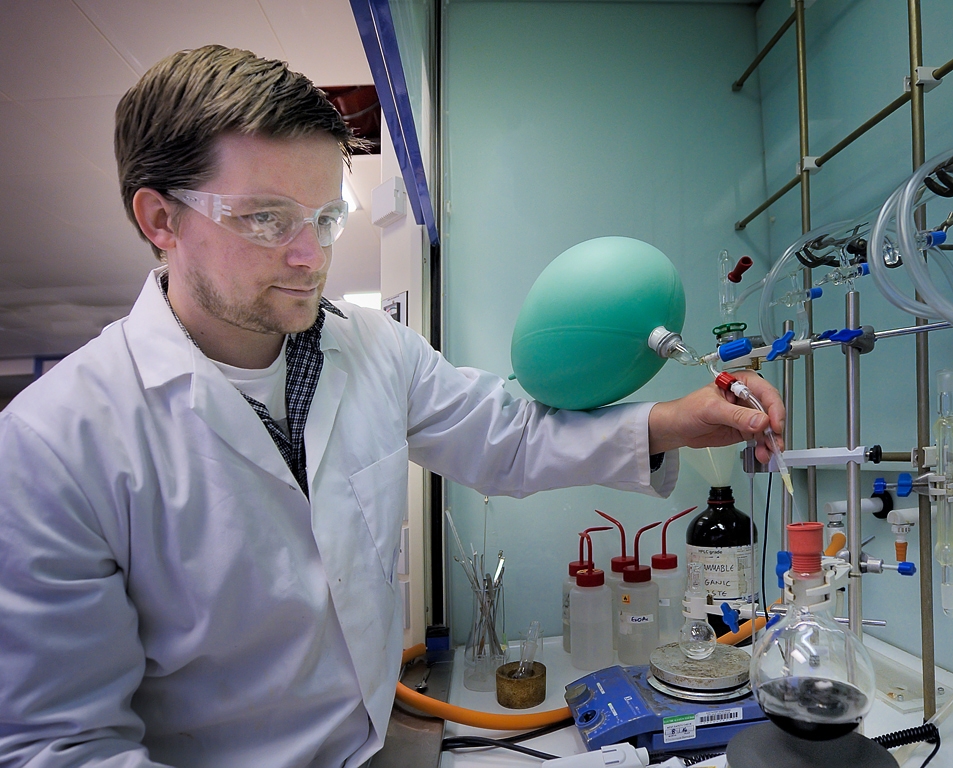 |
|
| Prof. Mélanie Ethève-Quelquejeu Paris Descartes University, France |
Mélanie Etheve-Quelquejeu is professor of Chemistry and the head of the Master program “Frontiers in Chemistry” at the University of Paris. She leads the group “Chemistry of RNAs, Nucleosides, Peptides and Heterocycles”, in the laboratory “Chimie & Biochimie, Pharmacologiques et toxicologiques”, UMR 8601. She obtained her PhD at the University UPMC, Paris VI, in France in 1997. She conducted postdoctoral studies first at Stanford University in California with Prof. J.P. Collman and then at Santa Barbara University with Prof. B. Lipshutz. She works on the field of Chemical biology of RNA and she developed chemical tools to explore the synthesis of cell wall of bacteria. These projects involve mostly the chemistry of nucleotides and nucleic acids, the synthesis of peptides and b-lactame derivatives and the methodological developments for post-functionalization of biomolecules. She is author of 60 publications, including J. Am. Chem. Soc (2007), Angewandte (2010, 2013, 2014, 2016) as the corresponding or co-corresponding author. She co-organized « the XXII Roundtable on Nucleosides, Nucleotides and Nucleic Acids », at the Pasteur Institut, (Paris, july 2016). Since 2016, she is scientific officer at the Institut de Chimie du CNRS (section 16). |
 |
|
| Dr. Romain Ferru-Clément University of La Rochelle, France |
Romain Ferru-Clément defended his thesis on fundamental aspects of the vesicular trafficking in the context of Cystic Fibrosis in 2012 and received his PhD from the University of Poitiers (UP). From 2012 to 2016, he was a postdoctoral research fellow at the UP where he investigated the molecular consequences of disturbances of the metabolism of lipid species in the context of lipotoxicity-related human diseases. In that time, he also contributed to the creation of the start-up Conic Meds that develops anti-lipotoxicity drug candidates at the preclinical stage. In 2016, he returned to the academic area and he is currently a temporary lecturer in molecular and cellular Biology at the faculty of Health Sciences of La Rochelle University. In 2017, he was associated to the IBD Genomic Medicine (iGenoMED) consortium (PI Pr John D. Rioux) in a translational research program using a multi-omic approach for the development of precision Medicine in Inflammatory Bowel Diseases (IBD). In this context, he notably worked with the metabolomic platform of the Montreal Heart Institute (Dir Pr Christine DesRosiers) on the profiling of the circulating lipidomic signature of CD patients. linkedin.com/in/romain-ferru-clément-625363183 |
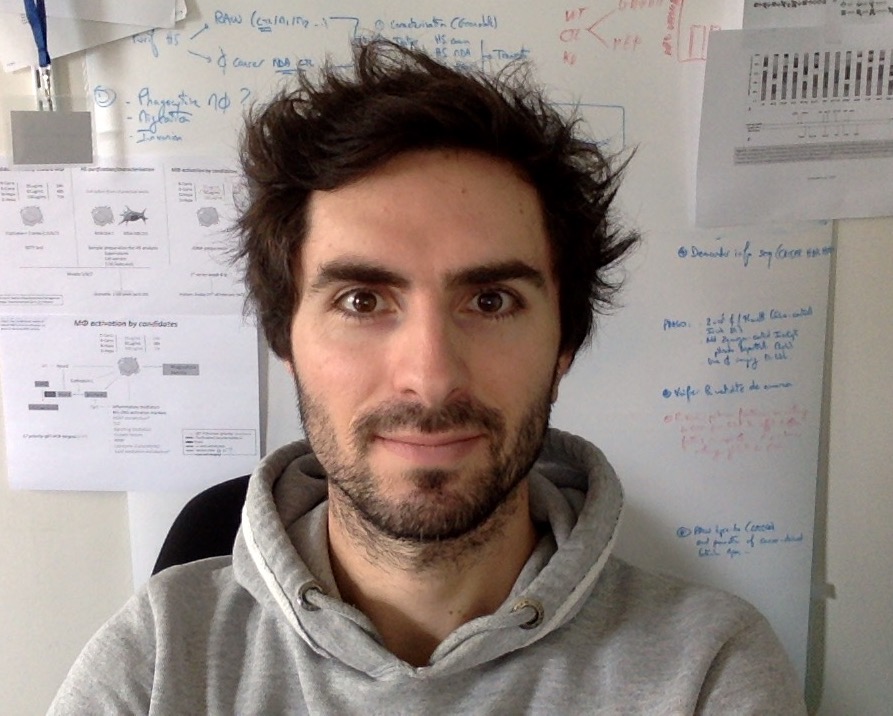 |
|
| Dr. Marion Flipo University of Lille, France |
Marion Flipo graduated from the National Graduate School of Chemistry and Chemical Engineering of Lille (France). She then received a master’s degree in organic chemistry (2003) followed by a PhD in medicinal chemistry (2006) at the University of Lille (France), during which she designed and synthesized metalloprotease inhibitors as antimalarial agents. Then, she spent several months at the Ferring Research Institute (San Diego, CA), a company specialized in peptide research before becoming an assistant professor in organic chemistry in 2008, at the University of Lille in UMR U1177 “Drugs and Molecules for Living Systems” directed by Pr Benoit Deprez. She focused her research on the development of new strategies to overcome antimicrobial resistance. She worked for several years on the discovery and optimization of inhibitors of EthR, a transcriptional repressor implicated in the innate resistance of M. tuberculosis to the anti-tuberculosis drug ethionamide. This work led to the successful development of very potent ethionamide boosters and a preclinical candidate has recently been selected for evaluation in imminent phase 1 clinical trials. Over the last four years, Dr Flipo has driven a medicinal chemistry project funded by the French national research agency (ANR JCJC program-2FightTB) to identify and optimize new anti-tuberculosis compounds. She is currently leading a medicinal chemistry work aiming at optimizing efflux pump inhibitors to fight Gram-negative infections in a French-German consortium funded by ANR (EFFORT project). |
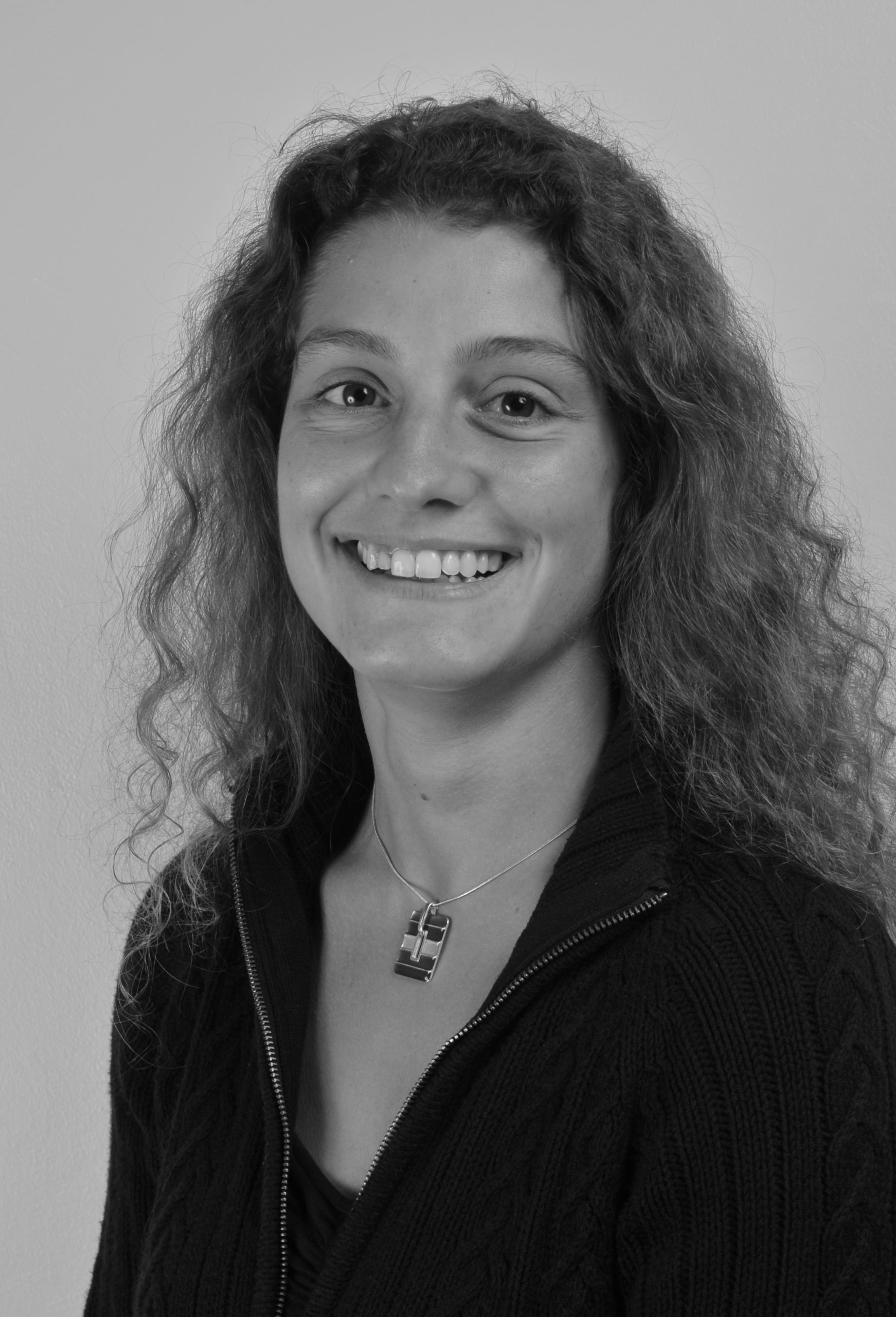 |
|
| Dr. Gilles Gasser Chimie ParisTech, PSL University, Paris, France |
Gilles Gasser was born, raised and educated in the French-speaking part of Switzerland. After a PhD thesis in supramolecular chemistry with Prof. Helen Stoeckli-Evans (University of Neuchâtel, Switzerland), Gilles undertook two post-docs, first with the late Prof. Leone Spiccia (Monash University, Australia) in bioinorganic chemisty and then as an Alexander von Humboldt fellow with Prof. Nils Metzler Nolte (Ruhr-University Bochum, Germany) in bioorganometallic chemistry. In 2010, Gilles started his independent scientific career at the University of Zurich as a Swiss National Science Foundation (SNSF) Ambizione Fellow before obtaining a SNSF Assistant Professorship in 2011. In 2016, Gilles moved to Chimie ParisTech, PSL University (Paris, France) to take a PSL Chair of Excellence. Gilles was the recipient of several fellowships and awards including the Alfred Werner Award from the Swiss Chemical Society, an ERC Consolidator Grant, the Thieme Chemistry Journal Award, the Jucker Award for his contribution to cancer research and recently the European BioInorganic Chemistry (EuroBIC) medal. Gilles’ research interests lay in the use of metal complexes in different areas of medicinal and biological chemistry. |
 |
|
| Prof. Panayiotis Koutentis University of Cyprus, Nicosia, Cyprus |
Education: Panayiotis A. Koutentis (CSci, CChem, FRSC) is Professor at the Department of Chemistry, University of Cyprus. He was born in Bristol (1969) and obtained his BSc (1992) and PhD (1997) at Imperial College working with the late Prof. Charles W. Rees (FRS, CBE). This was followed by a short stay with Prof. Roger Alder, (Bristol, 1997), and then postdoctoral work with Prof. Fred Wudl (UCLA, 1997-8), and with Prof. Robert Haddon (Lexington, Kentucky, 1999). In 1999, Prof. Koutentis was appointed Lecturer at the University of Cyprus and in 2009 achieved tenure. Awards: Awarded “The Golden Badge “Laureate” for the Art in Organic Synthesis of Heterocycles” by the International Scientific Partnership Foundation, International Foundation “Cultural Heritage” Award (2015). Total Citation: 3667; H–Index: 32; I10-Index: 92 (Google Scholar) Editorial/Advisory Board: Scientific Editor for Molecules, Sci, Molbank, ARKIVOC, Advances in Heterocyclic Chemistry; and Volume Editor for Comprehensive Heterocyclic Chemistry IV. |
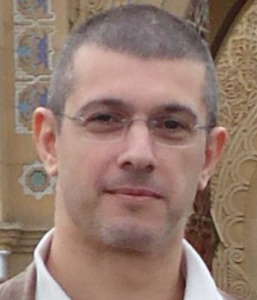 |
|
| Prof. Rui Moreira University of Lisbon, Portugal |
. |
| . | |
| Prof. Vittorio Pace University of Vienna, Austria |
Vittorio Pace (born 1981) graduated in Pharmacy in 2005 from the University of Perugia (Italy) and subsequently, received the PhD in Chemical Sciences cum laude from the Complutense University of Madrid in 2010 working with Profs. Alcántara and Sinisterra. After postdoctoral training at Vienna (Prof. Holzer, 2010-2011), Manchester (Prof. Procter, 2011-2013) and Stockholm (Prof. Olofsson, 2013-2014), he obtained a group leader position at the University of Vienna in 2014. Since 2018 he is holder of a TT Professorship in Drug Synthesis at the University of Vienna. In 2016 he received the Habilitation in Pharmaceutical Chemistry from the University of Vienna and, in 2017 the Habilitation for Full Professor of Organic Chemistry from the Italian Ministry of University. He received several awards including the Ciamician Medal of the Italian Chemical Society, the Caglioti Prize of the Accademia Nazionale dei Lincei, the Young Investigator Award of the Faculty of Life Sciences at Vienna, the La Roche-Hoffmann Prize of the European Society of Medicinal Chemistry, the Viennese Innitzer Award in 2017, the Habilitation Award of the Austrian Chemical Society in 2019 and the Thieme Journal Award in 2020. He published > 100 papers in peer reviewed journals and has a h index of 27. His research core is represented by the design and development of new chemoselective transformations with functionalized organolithiums. |
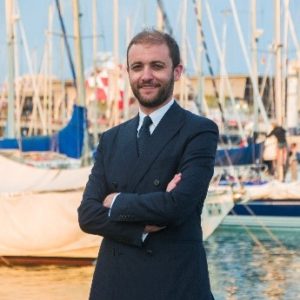 |
|
| Prof. Sébastien Papot University of Poitiers, France |
Sébastien Papot was born at the end of the second millennium and grew up in Niort (France) with his parents and two brothers. His bachelor degree in hands, he went to the University of Poitiers (France) where he studied organic chemistry. He obtained a Ph.D. in 1998 under the supervision of Prof. Jean-Pierre Gesson. The subject of his thesis was the study of glucuronide prodrugs for cancer chemotherapy. Then, he moved successively to the University of Orléans (Prof. G. Guillaumet, France) and the University College Cork (Prof. A. Maguire, Ireland) as a post-doctoral fellow working on several projects in the area of medicinal chemistry. During his stay in Cork, he became very interested in beer, especially Irish beer. In 2003, he moved back to Poitiers to start an academic career as an Assistant Professor. In 2014, he accepted a full professorship in the same university. He is currently the group leader of the “Programmed Molecular Systems” team. His research interests include the design of smart drug delivery systems for cancer chemotherapy, functional interlocked systems and prebiotic chemistry. Prof. Sébastien Papot is also the President of the French Society of Medicinal Chemistry and the cofounder of Seekyo, a privately-owned biotech company developing the next generation of chemotherapies. |
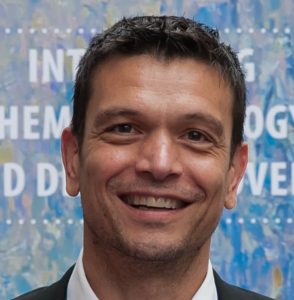 |
|
| Prof. Angela Russell University of Oxford, UK |
Angela Russell is Professor of Medicinal Chemistry in the Departments of Chemistry and Pharmacology at the University of Oxford. She gained her MChem degree from the University of Oxford in 2000 and her DPhil in Organic Chemistry in 2004. In 2007 she was awarded a prestigious Research Councils’ UK Fellowship in Medicinal Chemistry jointly between the Department of Chemistry and Pharmacology. In 2018 she was made Professor of Medicinal Chemistry. Her work lies at the interface of Chemistry, Biology and Medicine and aims to discover new small molecules and mechanisms to manipulate cell fate and translate them into therapeutic agents, particularly for degenerative diseases and cancer. She has published over 95 original articles, book chapters and patent applications. She has established a track record in the translation of her science, having founded two spin out companies, MuOx (now part of Summit Therapeutics plc) and OxStem Ltd in 2016, a spin-out company that aims to identify new classes of drugs that can re-programme or stimulate existing endogenous cells to repair tissues in age-related conditions including cancer, neurodegenerative diseases and heart failure. In recognition of this she was named in 2016 as a ‘Rising Star’ in the ‘BioBeat 50 Movers and Shakers in BioBusiness’ report, celebrating 50 outstanding women entrepreneurs and business leaders who are recognised for their contributions to global health innovation. |
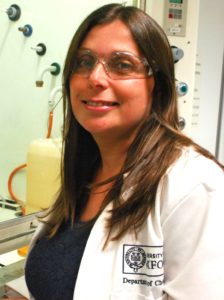 |
|
| Dr. Caroline West University of Orléans, France |
Caroline West is an associate professor in analytical chemistry at the University of Orleans, France. She is a Junior member of the French University Institute (IUF), a service of the Ministry of Higher education distinguishing a small number of university professors for excellent research. Her main scientific interests lie in fundamentals of chromatographic selectivity, both in the achiral and chiral modes mainly in SFC, but also in HPLC. She is also applying these methods to samples of pharmaceutical interest and natural products. She has authored 4 book chapters and about 100 papers in international peer-reviewed journals, and has presented about 100 lectures in national and international conferences and seminars. In 2015, she received the “LC-GC Emerging Leader in Chromatography” award from LC-GC North America and was ranked twice among the “Top 40 under 40” (2014 & 2018) and once in “The Power List” (2019) by The Analytical Scientist. She is also an advisory board member for several journals in separation science (Analytical Chemistry, Journal of Chromatography A, Chromatographia, LC-GC North America). |
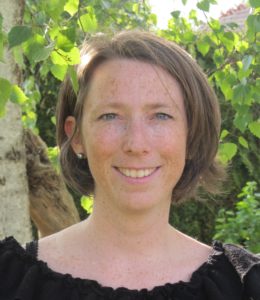 |
|
| Prof. Catalin Zaharia, Polytechnic University of Bucharest, Romania |
His research activity contributes to the development of knowledge in the field of polymeric biomaterials based on natural and synthetic compounds with biomedical applications (hydrogels, polymeric micro- and nanoparticles, hybrid biomaterials, composite materials – drug delivery systems, tissue engineering etc.). He has a PhD in Engineering Sciences (UPB, 2007) with the thesis “Studies regarding the synthesis and characterisation of new biopolymers for bone implants”. He also holds a PhD in Cell Biology obtained in 2009 in France (University of Angers, Faculty of Medicine). An important step in gaining expertise for biomedical applications of various materials was his participation in the postdoctoral project “Postdoctoral Program for advanced research in the field of nanomaterials, POSDRU/89/1.5/S/54785” with the subject “Conjugated polymeric nano- and microparticles for biomedical applications”. He has also participated in numerous research projects as coordinator or member in the research team (over 30 projects) related to the field of biomaterials: HYBRIDSIM-PN2, 307/2014; BIOSILKMAG-TE 03/10.2015; GREENVET-PN2155/2014; Smart materials for medical applications (INTELMAT) (leading the subproject 4), 39PCCDI/2018; REGMED (leading the subproject 3), 65PCCDI/2018 etc. Dr. Catalin Zaharia is also the Head of the Laboratory of Advanced Processing Methods for Polymers and Nanomaterials, (LMAPPN) L1M1 since 2016. He is also the Head of Department of Bioresources and Polymer Science since 2016 and Project team leader in Advanced Polymer Materials Group. Research activity: over 55-ISI quoted papers (journals like Acta Biomaterialia, Biomaterials, Journal of Biomechanics, Materials Science and Engineering C, Nanomaterials, Molecules, Drug Delivery etc); books in the field of polymeric materials, biomaterials, solar cells, polymer processing, additives for polymer processing; numerous oral and poster presentations at International Conferences, invited lectures. He is also reviewer for prestigious ISI-quoted journals: Molecules, Nanomaterials, Polymers, Gels, Antibiotics, Materials Science and Engineering C, Acta Biomaterialia, Journal of Applied Polymer Science, Journal of Chemical Technology and Biotechnology, Carbohydrate Polymers, Cell proliferation, Ceramics International, Macromolecules, Surface Coating and Technology, Journal of Nanotechnology, ACS Applied Materials & Interfaces, Cellulose etc. |
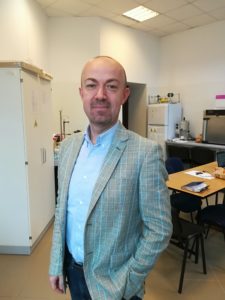 |